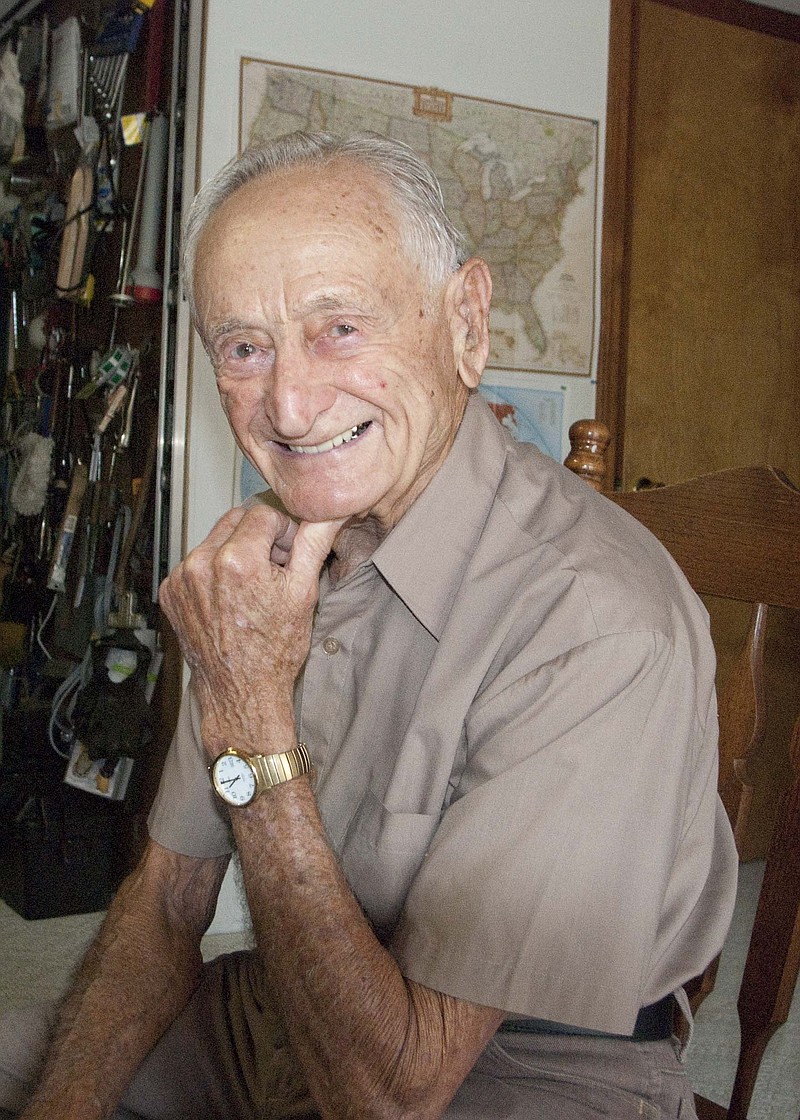During the past several decades, local resident Ed "Babe" Gross' love of dance has helped him establish a name for himself throughout the community. Whether teaching couples the jitterbug or "calling" a square dance, he's earned the reputation of knowing his way around a dance floor.
But lesser known is the time Gross invested nearly 70 years ago while a member of a bomber crew during World War II.
A 1938 graduate of Jefferson City High School, Gross learned at an early age the role fate could play in one's career.
"I went to a sheet metal school across the river (in Jefferson City) and because of that, was able to get a job at the Curtiss-Wright factory in St. Louis," said Gross, 92.
The young man then applied his sheet metal skills while building the B-25 Mitchell - a twin-engine bomber with which he would soon become familiar under a different set of circumstances.
The wheel of fate began its grind when he received a draft notice in 1943, and reported to Ft. Leonard Wood for his initial testing. It was here, Gross explains, that the military made the decision as to what branch of service he would be assigned.
"They said since I had worked in a factory and knew about airplanes, that I would go to the Air Force," he said, laughing.
Assigned to what was then known as the U.S. Army Air Forces (the Air Force was officially established in 1947), Gross was given a Morse code test on which he scored 100 percent.
"I was a dance instructor and the "tapping' (of the code relay) seemed to me to be just like music; I just listened to the rhythm."
With his previous employment dictating his service branch, he was now assigned as a radio operator because of his musically gifted insight into Morse code.
The young airman finished his basic training and traveled to Scott Field, Ill., for six months of radio operator instruction. From there, he was sent to Las Vegas for three months of gunnery school.
"We were slated for B-17s (bombers) after our training," Gross said, "but there was a shortage of radio operators and they asked for volunteers to serve on the B-25s." (B-25s were a twin-engine, medium-sized bomber.)
Though he had been advised by others not to volunteer for anything in the military, he raised his hand and was soon assigned to the same aircraft he had helped build while working in St. Louis.
Following B-25 familiarization training in South Carolina, Gross was transferred to an airstrip on Guadacanal, which the Marines had only recently captured from the Japanese.
At 23 years old, Gross notes he "was green as hell," but soon accumulated a lifetime of unforgettable experiences in a brief timeframe.
For the next two years, he served aboard the B-25 as both a radio operator, and at times, a .50-caliber machine gunner while his plane participated in 72 bombing missions in locations throughout the South Pacific.
"There were two .50 calibers in the middle of the plane near where my radio equipment was set up," Gross said. "Most of the time we had (fighter plane) escorts, but there were other times we had to defend against Japanese Zeros."
Grinning, he added: "When we had a squadron of 10 or 12 planes and a Japanese fighter came in ... well, we'd all start firing our guns and those (Japanese) planes didn't stick around very long."
Toward the latter part of the war, Gross became the radio operator on planes participating in transport missions carrying high-ranking officers from the Phillipines to Sydney, Australia, for conferences.
In 1945, he returned to the states and remained in San Antonio for two months training new recruits who would eventually serve as radio operators.
When he received his discharge, the combat veteran returned to Jefferson City and enrolled in the University of Missouri in early 1946. Three years later, after attending classes year round, Gross graduated with his bachelor's degree in business administration.
Hired by the Missouri Highway Department, Gross spent 32 years with the agency, retiring in 1982 as the supervisor of the data reduction center. He has continued to share his lifelong passion for music through the many dance classes he has taught throughout the years.
With many notable experiences originating from his time in the South Pacific, the veteran describes one sobering realization that he encountered in combat.
"It's been 70 years ago," Gross said, "but I remember the most difficult part (of my military service) was that first mission. I was 23 years old and believed I was indestructible ... that nobody could get to me."
Calling on the wisdom gained from experience, he added: "But on that mission, when that first explosion came of the right wing of our plane, I immediately realized this was serious business."
Jeremy P. Amick writes on behalf of the Silver Star Families of America.

